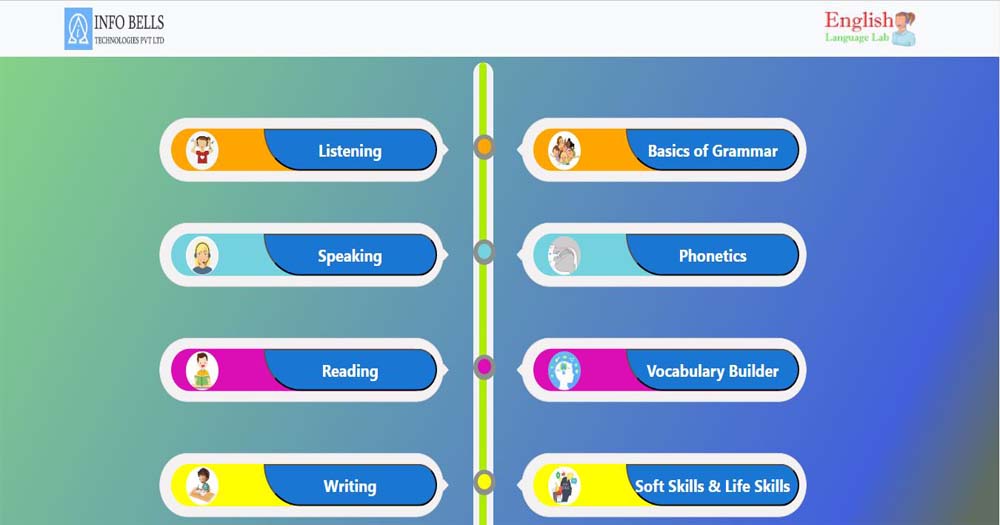Loading...
- Welcome to INFO BELLS TECHNOLOGIES PRIVATE LIMITED
English Language Lab
English Language Lab
A language laboratory is a lab/room set up in a school to learn any foreign language in a more effective way, emphasizing on development of speaking and listening skill.
According to American Heritage, “Language laboratory is a room designed for learning foreign languages and equipped with tape recorders, video cassette recorders, or computers connected to monitoring devices enabling the instructor to listen and speak to the students individually or as a group."
According to the Webster’s New World College definition, “The language laboratory is a classroom in which students learning a foreign language can practice sound and word patterns individually or under supervision with the aid of audio equipment, etc.”
We may say, “A Language Laboratory is a room in a School, College, Training Institute, University or Academy that contains special equipment to help students learn foreign languages by listening to tapes or CDs, watching videos, recording themselves, etc.”

Techniques to improve macro skills of language
The most important learning ability is listening. It is what is referred to as a latent skill or a responsive ability since it expects us to use our ears and minds to comprehend what is being said to us or addressed to us. It is the first of two typical learning skills.
Listening is one of the important skills for students as well as to professionals. Listening is an inherent and inborn skill that any human being. Out of the four skills of communication, listening is used the highest in our day-to-day context.
The key to learning a language is the frequent exposure and use of vocabulary and grammar. The average person must be exposed to a word or phrase 100s of times before integrating it into fluent conversation. This is easily made possible through DLM by picking-up a base vocabulary of approximately 2000 words for everyday use by learning the rules of grammar; practicing vocabulary Lessons; doing grammar exercises and listening to interactive stories/situations.
One of the first things you learn about reading is that there are many different reading strategies. Students should be aware of which strategy is best for the reading effort demanded by the particular topic or by their educator or teacher.
Reading is one of the important skills for various academic and information gathering purposes. Reading is an acquired and learnt skill in human beings and it is absolutely absent in animals as it requires intellect and logical inference of verbal codes.
Writing is one of the important skills for various formal and informal information dissemination. Like reading, writing is an acquired and learnt skill in human beings and it is absolutely absent in animals as it requires intellect and logical inference of verbal codes. Out of the four skills of communication, writing is used the least in our day-to-day context. We usually avoid writing. Unless it is extremely important. Writing, thus, is very useful and important skill in conveying various information in different academic and non-academic situations in our life.
Oral learning takes place through speaking as the communication medium. Our lungs, vocal tract, vocal lines, tongue, teeth and lips are just a couple of the body parts that we use to create sounds when we communicate.
Like listening, speaking is also one of the important skills for students as well as to professionals. Speaking is also an inherent and inborn skill that any normal human being has. Out of the four skills of communication, listening is used the second most in our day-to-day context.
English grammar is the set of rules and principles that need to be followed in order to read, speak and write the English Language Properly. From mastering verb tenses and sentence structures to understanding how to use different words and phrases to convey different meanings, learning English grammar can open up a world of possibilities for you as a second language learner.
It includes the structure of words, phrases, clauses, and sentences, as well as their formation and use in communication.
Phonics is a linguistic tool used to help people learn how to speak and write any language that uses an alphabet. The method consists of distinguishing how sounds are heard and relating them to the general spelling patterns of a language. The goal of phonics is to help students learn the principle of a language's alphabet through a logical and repeated relationship between spellings and sounds.
Phonics is often used in early grade school and language basics courses to assist learners in decoding the patterns of a language. With this skill, students are able to read, write, hear, and speak a language more effectively. They are also able to comprehend and decode new or challenging words more easily on their own.
Soft skills include any skill that can be classified as a personality trait or habit. Interpersonal skills and communication skills are more specific categories of these, that many employers look for in job candidates.
Life skills refer to the skills necessary to help you manage everyday activities, with some examples of life skills including problem-solving, communication or resilience. Mastering these skills can help improve many areas of your life, including your relationships and career progression. The life skills you need can change depending on your culture, background and age. Life skills can also refer to interpersonal, cognitive or behavioural skills to help you succeed in life.
Vocabulary building skills are what children need to develop their growing vocabulary. Teachers typically encourage children to read widely and research. That's what building a vocabulary is - seeing a new word, researching what it means, and tucking it away to use later.

